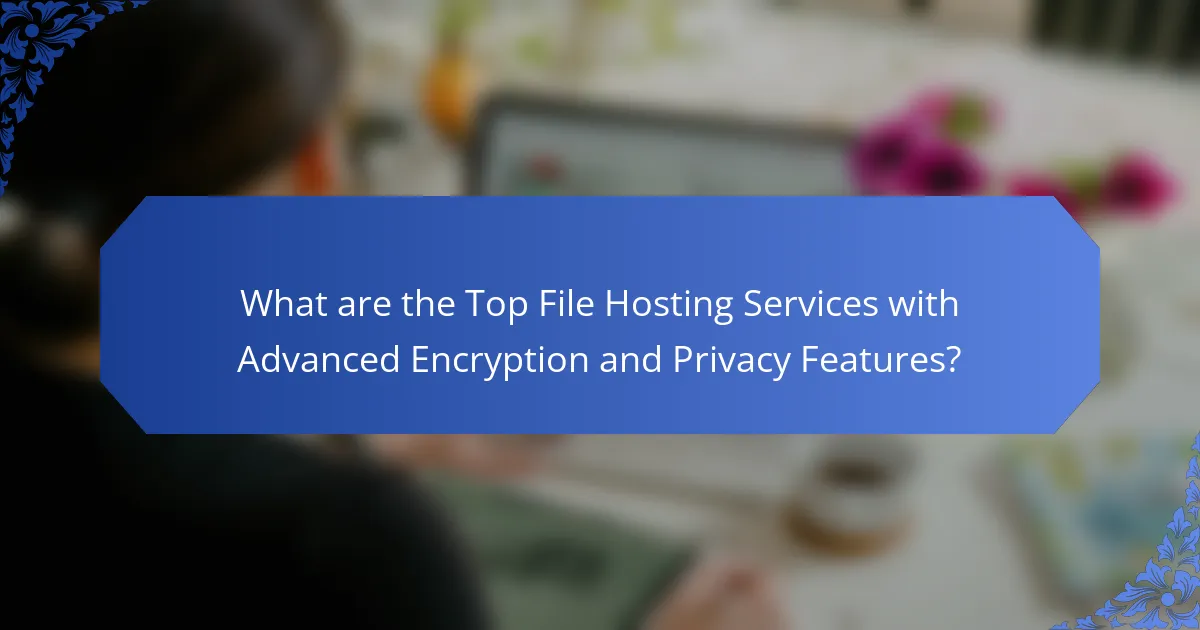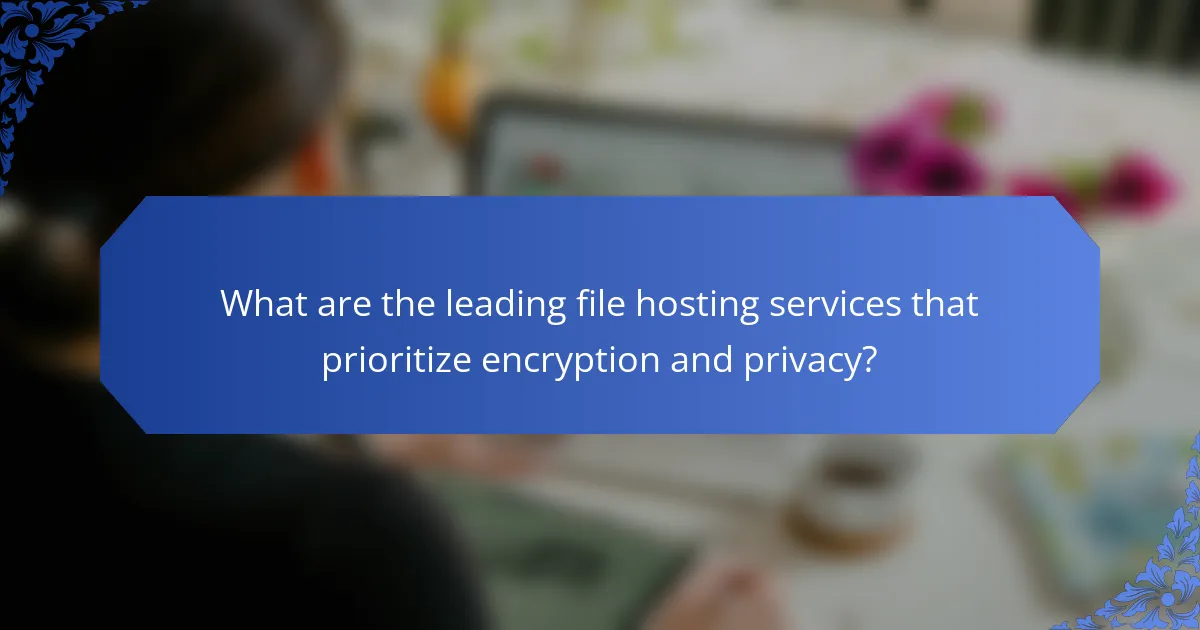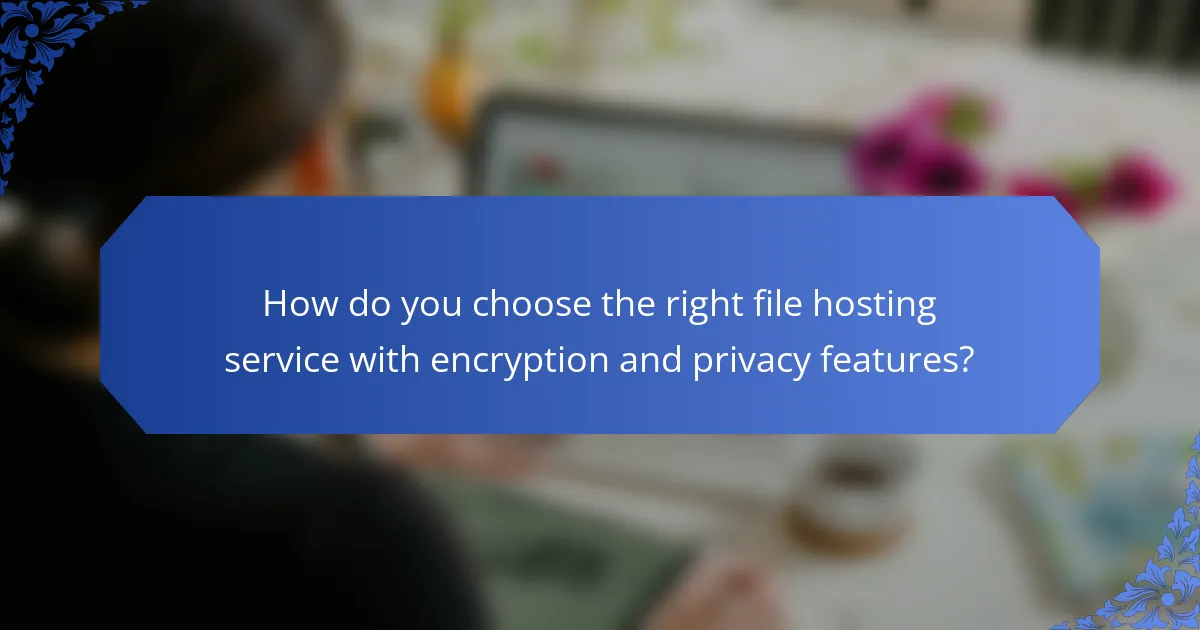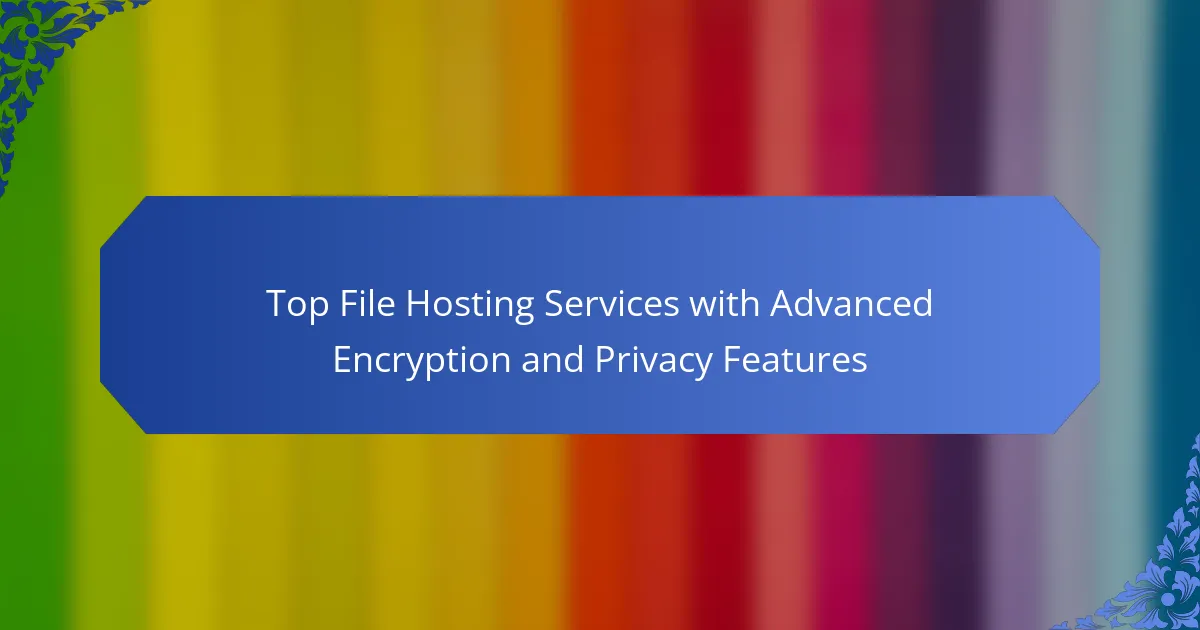Tresorit, Sync.com, and pCloud are leading file hosting services known for their advanced encryption and privacy features. Tresorit employs end-to-end encryption and a zero-knowledge architecture, ensuring that only users can access their data. Sync.com also utilizes end-to-end encryption while adhering to Canadian privacy laws, emphasizing user privacy. pCloud offers client-side encryption through its pCloud Crypto service, allowing users to secure files prior to uploading. The article evaluates these services based on their encryption standards, privacy compliance, and additional security features, providing guidance for selecting a secure file hosting solution.

What are the Top File Hosting Services with Advanced Encryption and Privacy Features?
Tresorit, Sync.com, and pCloud are top file hosting services with advanced encryption and privacy features. Tresorit uses end-to-end encryption and zero-knowledge architecture, ensuring that only users have access to their data. Sync.com also offers end-to-end encryption, with a strong focus on privacy compliance. pCloud provides client-side encryption through its pCloud Crypto service, allowing users to secure their files before uploading. These services are recognized for their robust security measures and commitment to user privacy.
How do these services ensure advanced encryption?
These services ensure advanced encryption by implementing strong encryption protocols. They commonly use AES-256 encryption, which is recognized for its high level of security. This standard encrypts data both at rest and in transit. Data at rest is stored in encrypted form on servers. Data in transit is protected using TLS/SSL protocols, preventing interception during transfer. Additionally, many services offer end-to-end encryption. This means that only the user has access to the decryption keys. Regular security audits and compliance with industry standards further validate their encryption practices. These measures collectively enhance the overall security of the data stored and shared through these services.
What types of encryption methods are commonly used?
Commonly used encryption methods include symmetric encryption, asymmetric encryption, and hashing. Symmetric encryption uses the same key for both encryption and decryption. Examples of symmetric algorithms are AES and DES. Asymmetric encryption uses a pair of keys, one public and one private. RSA and ECC are well-known asymmetric algorithms. Hashing converts data into a fixed-size string, ensuring data integrity. SHA-256 is a widely used hashing algorithm. Each method serves distinct purposes in data security and privacy.
How does encryption enhance file security?
Encryption enhances file security by converting data into a coded format that is unreadable without a decryption key. This process protects sensitive information from unauthorized access. When files are encrypted, even if they are intercepted, the data remains secure. According to a 2020 study by the Ponemon Institute, 60% of organizations experienced data breaches due to unencrypted data. Encryption also ensures compliance with regulations such as GDPR and HIPAA, which mandate the protection of personal data. By using strong encryption algorithms, such as AES-256, the risk of data theft is significantly reduced. Thus, encryption serves as a critical layer of security for files stored in various platforms.
What privacy features should you look for in file hosting services?
Look for end-to-end encryption in file hosting services. This feature ensures that only you and those you authorize can access your files. Additionally, check for zero-knowledge architecture. This means the service provider cannot access your data, enhancing your privacy. Multi-factor authentication is also crucial. It adds an extra layer of security by requiring more than just a password to access your account.
Data residency options are important as well. They allow you to choose where your data is stored, which can affect privacy laws applicable to your files. Regular security audits by third parties can provide assurance about the service’s safety. Lastly, ensure that the service has a clear privacy policy detailing how your data is used and protected.
How do these features protect user data?
Advanced encryption and privacy features protect user data by securing files during transfer and storage. Encryption scrambles data, making it unreadable without a decryption key. This prevents unauthorized access during file uploads and downloads. Additionally, end-to-end encryption ensures only the sender and recipient can access the data. Privacy features, such as zero-knowledge protocols, mean service providers cannot view user files. Multi-factor authentication adds another layer of security by requiring additional verification to access accounts. These measures significantly reduce the risk of data breaches and unauthorized access.
What role does user control play in privacy protection?
User control is essential in privacy protection as it empowers individuals to manage their personal data. This control allows users to decide what information to share and with whom. By exercising control, users can limit exposure to potential data breaches. Research indicates that when users have clear options for privacy settings, they are more likely to engage with services responsibly. For instance, a study by the Pew Research Center found that 81% of Americans feel they have little to no control over their data. Thus, enhancing user control is crucial for building trust in digital platforms.
Why is it important to choose a file hosting service with advanced encryption?
Choosing a file hosting service with advanced encryption is crucial for protecting sensitive data. Advanced encryption safeguards files from unauthorized access during storage and transmission. This means that even if data is intercepted, it remains unreadable without the encryption key. Services with strong encryption protocols, such as AES-256, provide a high level of security. According to a 2021 report by Cybersecurity Ventures, ransomware attacks increased by 150% in 2020, highlighting the need for secure file storage. Additionally, GDPR and other regulations mandate the protection of personal data, making encryption a legal necessity for compliance. Therefore, selecting a service with advanced encryption is essential for both security and regulatory adherence.
What are the risks of using file hosting services without strong encryption?
Using file hosting services without strong encryption exposes sensitive data to unauthorized access. Without encryption, files are transmitted in plaintext. This means that anyone intercepting the data can easily read it. Hackers often target unencrypted data during transmission or storage. Additionally, data breaches can occur if the hosting service is compromised. According to a 2020 report by Verizon, 80% of data breaches involve weak or stolen credentials. This highlights the importance of encryption in protecting sensitive information. Without it, personal and business data can be exploited, leading to financial loss or identity theft.
How can strong encryption impact user trust?
Strong encryption significantly enhances user trust in file hosting services. Users feel secure knowing their data is protected from unauthorized access. This security leads to increased confidence in using the service. A survey by Cybersecurity Insiders found that 93% of organizations believe encryption improves customer trust. Furthermore, strong encryption can prevent data breaches, which are known to erode user trust. When users know their information is safe, they are more likely to share sensitive data. This trust can lead to higher user retention and satisfaction rates. Overall, strong encryption is a crucial factor in building and maintaining user trust in digital services.

What are the leading file hosting services that prioritize encryption and privacy?
Leading file hosting services that prioritize encryption and privacy include Tresorit, Sync.com, and pCloud. Tresorit offers end-to-end encryption and zero-knowledge security. Sync.com provides strong encryption and complies with Canadian privacy laws. pCloud features client-side encryption with its pCloud Crypto service. These services ensure that user data remains secure and private. Each platform has been recognized for its robust security measures.
Which services offer the best encryption protocols?
ProtonDrive and Tresorit offer the best encryption protocols. ProtonDrive uses end-to-end encryption, ensuring that only users can access their files. Tresorit also employs zero-knowledge encryption, meaning the service provider cannot access user data. Both services comply with strict privacy regulations, enhancing data security. Their encryption methods are recognized as industry-leading. ProtonDrive utilizes AES-256 encryption, while Tresorit employs AES-256 and RSA-4096 for added security. These features make them top choices for users prioritizing data protection.
What are the specific encryption standards used by these services?
The specific encryption standards used by top file hosting services include AES-256, RSA-2048, and TLS 1.2. AES-256 is widely recognized for its strong encryption capabilities, providing robust protection for stored files. RSA-2048 is commonly used for secure key exchange and authentication processes. TLS 1.2 ensures secure communication between clients and servers, safeguarding data in transit. These encryption standards are integral to maintaining user privacy and data security in file hosting services.
How do these standards compare across different providers?
Standards for encryption and privacy features vary significantly across different file hosting service providers. Some providers implement end-to-end encryption, ensuring that only users can access their files. Others may use server-side encryption, which allows the provider access to user data. Additionally, privacy policies differ; some services have strict no-logs policies, while others may collect user data for marketing purposes. According to a 2023 study by TechRadar, providers like Tresorit and Sync.com are noted for robust privacy measures, while services like Google Drive and Dropbox have more lenient policies. These differences can impact user trust and data security.
What unique privacy features do these services provide?
Top file hosting services provide unique privacy features such as end-to-end encryption, zero-knowledge encryption, and anonymous file sharing. End-to-end encryption ensures that only the user and intended recipients can access the files. Zero-knowledge encryption means that the service provider cannot access the user’s data at any point. Anonymous file sharing allows users to share files without revealing their identity. These features enhance data security and user privacy. Services like Tresorit and Sync.com are known for implementing these advanced privacy measures.
How do these features differ from standard offerings?
Advanced encryption and privacy features significantly enhance security compared to standard offerings. Standard file hosting services typically use basic encryption methods, leaving data vulnerable. In contrast, advanced features include end-to-end encryption, ensuring that only authorized users can access files. These services often employ zero-knowledge protocols, meaning providers cannot access user data. Additionally, advanced privacy features may involve enhanced user controls and customizable security settings. This level of protection is crucial for sensitive information, as evidenced by growing data breach statistics. According to a report by Cybersecurity Ventures, global cybercrime damages are projected to reach $10.5 trillion annually by 2025. Therefore, the differences in features directly correlate with improved security and user privacy.
What are the user experiences regarding privacy with these services?
User experiences regarding privacy with top file hosting services vary widely. Many users express concerns about data security and unauthorized access. Reports indicate that some services have experienced data breaches, leading to user distrust. Users often seek services that offer end-to-end encryption to safeguard their files. Reviews highlight the importance of transparent privacy policies. Some users appreciate features like zero-knowledge encryption, which ensures that only they can access their data. However, others report confusion about how their data is stored and shared. Overall, privacy remains a critical factor influencing user satisfaction with these services.

How do you choose the right file hosting service with encryption and privacy features?
To choose the right file hosting service with encryption and privacy features, evaluate the encryption standards used. Look for services that offer end-to-end encryption. This ensures that only you can access your files. Check if the service provides zero-knowledge encryption. This means the provider cannot access your data at all. Review the privacy policy to understand data handling practices. Ensure the service complies with relevant privacy regulations, such as GDPR. Assess additional security features, like two-factor authentication. Research user reviews and expert opinions for real-world experiences. Choose a service with a solid reputation for privacy and security.
What factors should you consider when evaluating these services?
When evaluating file hosting services with advanced encryption and privacy features, consider security protocols. Look for end-to-end encryption to ensure data is protected during transfer and storage. Assess the service’s compliance with data protection regulations, such as GDPR. Review user access controls to manage who can view or edit files. Check for data redundancy measures to prevent loss. Evaluate the service’s reputation and user reviews for reliability. Consider the ease of use and integration with other tools. Finally, analyze pricing plans to ensure they fit your budget while meeting your security needs.
How does pricing influence your choice of service?
Pricing significantly influences the choice of file hosting services. Consumers often compare costs when selecting a service. Higher prices may imply better features or security. Conversely, lower prices may attract budget-conscious users. Many users assess the value provided relative to the cost. Research shows that 70% of users prioritize pricing in their decision-making process. Additionally, competitive pricing can lead to increased customer loyalty. Overall, pricing is a critical factor in determining which file hosting service to choose.
What role does customer support play in your decision?
Customer support plays a critical role in the decision-making process for file hosting services. Effective customer support ensures quick resolution of issues, which enhances user experience. A responsive support team can address concerns about encryption and privacy features. According to a 2022 survey by Zendesk, 76% of customers prioritize support quality when choosing a service. This indicates that reliable support can influence customer loyalty and satisfaction. In the context of file hosting, knowing that assistance is readily available can reassure users about data security. Thus, strong customer support can be a decisive factor in selecting a file hosting service.
What are some best practices for using file hosting services securely?
Use strong, unique passwords for file hosting accounts. Enable two-factor authentication for added security. Regularly update passwords to mitigate risks. Avoid sharing sensitive files without encryption. Utilize end-to-end encryption features offered by the service. Be cautious of public Wi-Fi when accessing files. Regularly review sharing permissions on files and folders. Monitor account activity for unauthorized access.
How can you enhance your own security when using these services?
To enhance your own security when using file hosting services, utilize strong, unique passwords for each service. Implement two-factor authentication wherever available. Regularly update your passwords to mitigate risks. Encrypt sensitive files before uploading them to the service. Be cautious about sharing access links and permissions. Monitor your account activity for any unauthorized access. Use a reputable security software to protect your devices. These practices reduce the likelihood of data breaches and unauthorized access to your files.
What common mistakes should you avoid to maintain privacy?
Common mistakes to avoid for maintaining privacy include oversharing personal information online. Many users post details on social media that can be used to identify them. Using weak passwords is another critical error. Weak passwords can be easily guessed or cracked by attackers. Failing to enable two-factor authentication increases vulnerability. Two-factor authentication adds an extra layer of security. Ignoring software updates can also compromise privacy. Outdated software may have security flaws that can be exploited. Lastly, using public Wi-Fi without a VPN exposes data to interception. A VPN encrypts data, protecting it from potential threats on public networks.
The main entity of the article is file hosting services that prioritize advanced encryption and privacy features. The article examines top services such as Tresorit, Sync.com, and pCloud, highlighting their use of end-to-end encryption, zero-knowledge architecture, and client-side encryption. It discusses the importance of strong encryption protocols like AES-256, the role of user control in privacy protection, and the risks associated with using services lacking robust security measures. Additionally, the article provides guidance on evaluating these services based on encryption standards, privacy policies, and customer support, while outlining best practices for secure usage.
